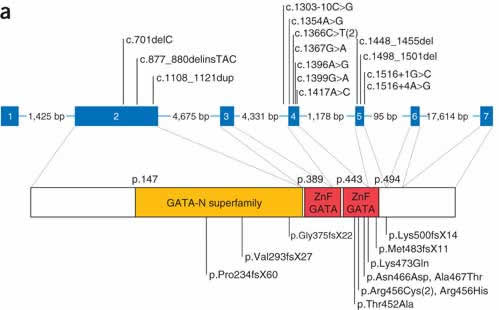This web page was produced as an assignment for an undergraduate course at Davidson College.
The BBC published a story in December 2011 which attempted to describe the implications of a recent discovery concerning pancreatic agenesis (BBC 2011). The research which inspired the BBC story had been published the previous day in the journal nature. Of note, is the marked difference in content between the two descriptions.
Research Findings
Before one can judge the quality of the BBC writers journalism, it is necessary to understand the content of the original research. The purpose of the research was to determine a possible genetic cause for pancreatic agenesis (Allen et. al 2011). For the purposes of the paper in question, the term "pancreatic agenesis" was used to describe a group of conditions ranging from total agenesis to pancreatic hypoplasia. This condition manifests itself clinically as neonatal insulin-dependent diabetes. Insulin dependent (or type-1) diabetics do not produce sufficient insulin for glucose regulation and must use either injections or an external pump to provide the enzyme. Mutations in PDX1 and PTF1A were previously known to cause agenesis. However, only a minority of all cases can be traced to a mutation in either gene (Allen et al. 2011). The Peninsula College researchers were in search of an explanation for the remainder of the cases. Such research has only recently been possible due to the advent of modern whole-genome techniques.
The researches found that in 56% of their sample population of patients there was some mutation in the GATA6 gene. Sequencing revealed that the type and location of mutation was highly variable.
Figure 1. The natures and locations of the various observed muations. (Allen et al. 2011)
In 80% of the cases, parental genomes were available. The researches were therefore able to determine that in each case, the mutation was new rather than inherited (Allen et al. 2011). This clarified the questions raised by the observation that the mutant alleles behaved as dominant, but were not observed in previous generations. <i>GATA6</i> alleles are dominant due to a phenomenon known as haploinsufficiency. This means that two functional copies of a gene are neccesary for the production of adequate gene product.
The resarchers mention the possible implications of their work for diabetes treatment, but do not go into detail. That is the most noticeable difference between the scientific literature and the popular press representation.
The Popular Article
The BBC article presents the story wholy based on its implications. The actual findings of the experiment are nowhere to be found. The only meaningful conclusion one can draw from the BBC article is that <i>GATA6</i> is essential to the formation of beta cells. The majority of the rest of the article is concerned with explaining diabetes.
Is That Good Journalism?
Kua et al. assert that the science journalist has three responsibilities; the be a "watchdog," an "intermediary," and a "tool giver"(2004). The BBC certainly fulfills the watchdog role. They informed to public of the proceedings in a timely manner and did not let a significant story go untold. As an intermediary, they do not do quite so well. The reader of the BBC story, as previously mentioned, learns little about the importance of the study. Of course, terms like "haploinsufficiency" and "hypoplasia" would encumber most readers. However, the fact that this one gene represents an entirely new understanding of pancreatic agenesis is completely absent. One must give the authors credit as tool-givers. Though the story is lacking in content, it relays well the implications of the reaserch and the possible future directions. One mustn't be too critical, the job of the popular press science journalist is very difficult indeed.
Works Cited
